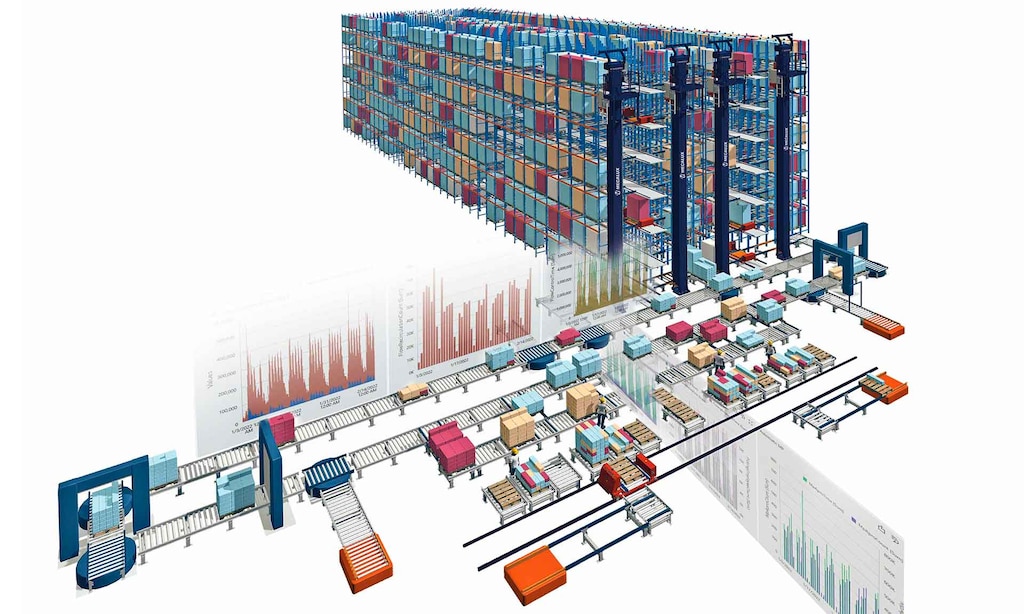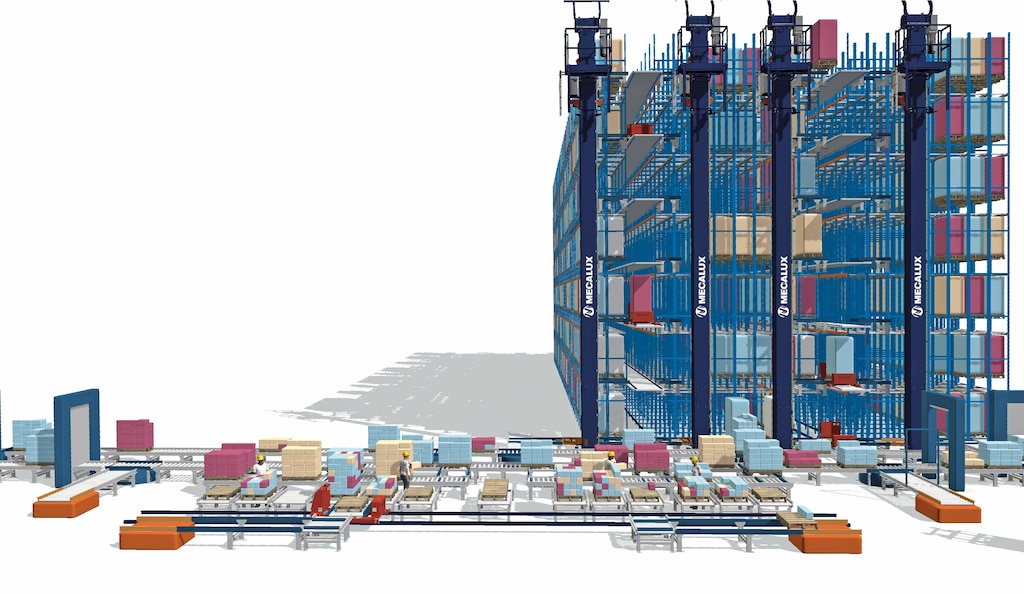BUSINESS FOCUS
The increased volumes of information generated by companies have incentivised the development of new applications and methods capable of managing very diverse data and analysing them efficiently. Machine learning is a branch of artificial intelligence that, with the help of advanced algorithms, interprets data to create predictions designed to improve processes and respond to challenges. Mecalux’s technical team employs algorithms and machine learning to improve efficiency in logistics processes such as demand forecasting, stock management and warehouse design.

Logistics processes are aimed at providing customers with fast service and delivering the exact quantities of goods to the right place at the right time. However, these processes can be affected by changes in consumer trends or other external factors. Companies turn to technology to identify supply chain risks and apply measures that help to minimise their consequences.
One of the forecasting systems with the greatest potential is machine learning. This field of artificial intelligence uses advanced algorithms to process a huge amount of information and to identify patterns. By repeating this analysis constantly, the system perfects its performance until more accurate results are obtained. According to the research study Machine learning and deep learning from the University of Würzburg, Germany, “The capacity of [machine learning] for advanced problem solving, generally termed artificial intelligence (AI), is based on analytical models that generate predictions, rules, answers, recommendations, or similar outcomes.”
Machine learning consists of applying algorithms that learn iteratively from data, enabling computer systems to find hidden insights and complex patterns.
In logistics, according to a report from the MIT Center for Transportation & Logistics, machine learning can be applied to the supply chain to carry out appropriate demand planning and to automate operations such as inventory control and the organisation of order distribution routes.
How Mecalux exploits machine learning
When enhancing a customer’s warehouse, Mecalux utilises a data analysis platform with machine learning algorithms capable of drawing conclusions and proposing recommendations to meet any logistics requirement. Using the facility’s historical data, the algorithms can predict behaviour, trends and the throughput of the machines. Based on objective data, the predictions are highly reliable and facilitate strategic decision-making for the business.
Mecalux employs an automated machine learning process — AutoML — to analyse part of the warehouse data in pursuit of the best business decisions. Once the analysis is finished, the advanced algorithms compare the prediction made with the rest of the data to determine its failure rate. This is because any prediction is subject to a series of conditioning factors and alternatives. For instance, a company might need to step up its number of daily orders. To do this, it could make several equally valid decisions: increase its number of SKUs, optimise operator movements, implement a warehouse management system (WMS) or invest in pick-to-light devices.
AutoML — the automated machine learning process employed by Mecalux — analyses part of the warehouse data in pursuit of the best business decisions
The automated machine learning system used by Mecalux to predict the future needs of the warehouse collects a vast amount of different types of data. These include the movements made by the handling equipment, the time taken by machines to carry out activities (e.g., in the case of stacker cranes, product storage), the quantity of flows taking place, the number of goods received and orders dispatched on a daily basis, and the types of orders prepared.
The machine learning system developed by Mecalux is extensible: additional data, metrics, and predictive elements can be added to respond to current logistics challenges and anticipate future needs. Tens of millions of pieces of data can be managed for each customer, providing a more detailed analysis in which more variables and scenarios are taken into account. The forecasting system is fed with new data to automatically improve itself and detect possible improvements in the warehouses.
What do Mecalux’s algorithms do with the data? Mecalux’s machine learning tools execute four main functions:
- Choose, from millions of data, the relevant information for each analysis, discarding unnecessary data in order to obtain a reliable prediction.
- Extract the characteristics to define the working hypothesis.
- Iterate different models and algorithms and adjust their hyperparameters until selecting the best option.
- Build and use the best model to make all predictions.
The machine learning system employed by Mecalux evaluates the data and models until the best prediction is chosen for each warehouse. If the parameters established change over time, the system is automatically updated to continue adapting to the dynamic development experienced by all supply chains.
Warehouse data can be utilised to make the following predictions:
- Demand forecasting. Time series and multivariate regression models can be employed to predict demand in the short, medium and long term. With this information, it is possible to calculate the appropriate stock levels to prepare orders without delay.
- Dispatch planning. Predicting the time required to dispatch goods helps to organise work in advance, speeding up and streamlining order distribution.
- Stock control. Inventory forecasting calculates the number of days left until a product will be sold out. With this information, the business can perform actions such as generating a purchase order for more products in the ERP system.
For Mecalux, the objective of machine learning is to create predictions automatically to boost its customers’ supply chains. By analysing objective data, logistics managers can propose strategic improvements in their facilities to leverage all warehouse resources.

Algorithms to anticipate the future
At a time when companies need to modernise to optimise processes, adjust to the evolution of the market and provide better customer service, machine learning constitutes a strategic tool for facilitating decision-making. In logistics, predictive analytics has enormous potential: it can assess the current business model and, if necessary, overhaul it to cope with market changes.
Warehouses generate copious amounts of information. Therefore, Mecalux’s algorithms aim to bolster business decisions and help companies’ supply chains to run smoothly and efficiently.
